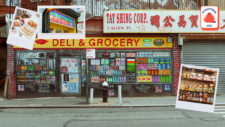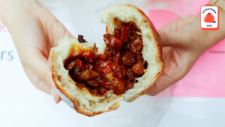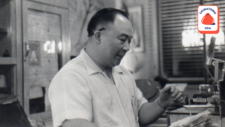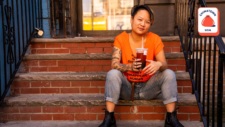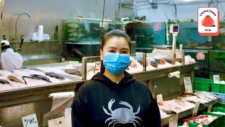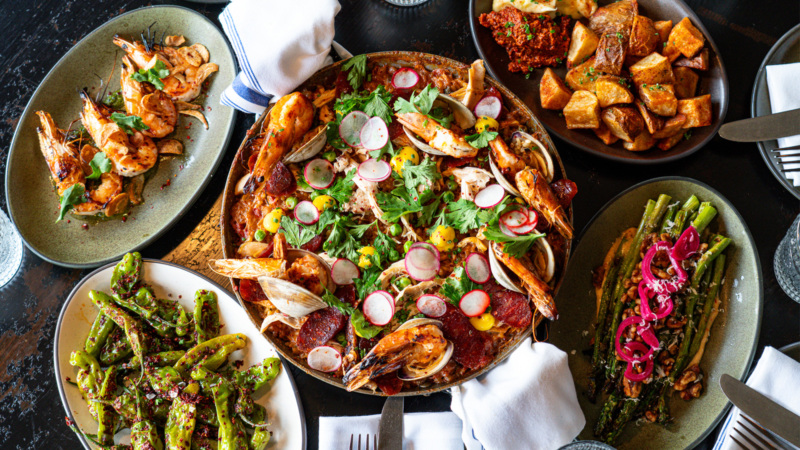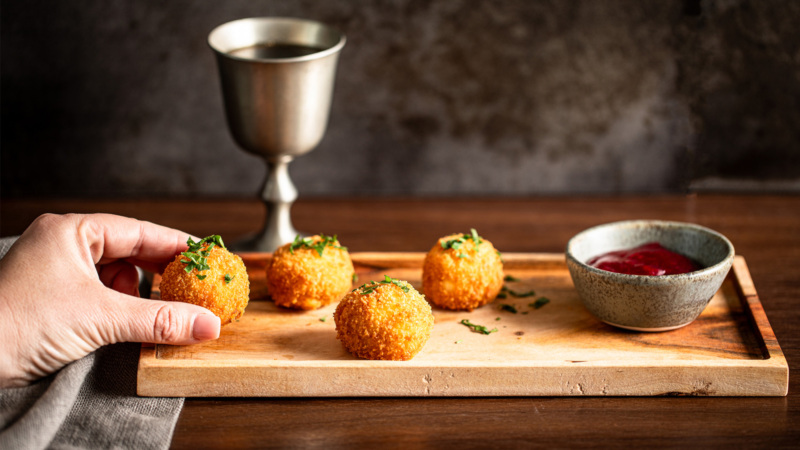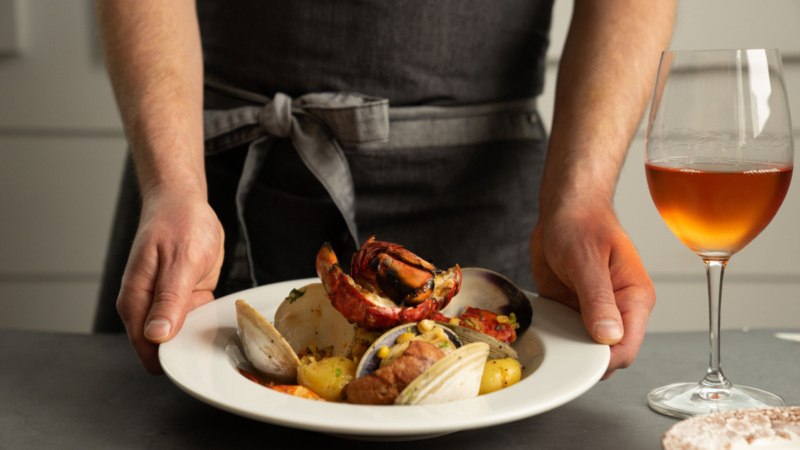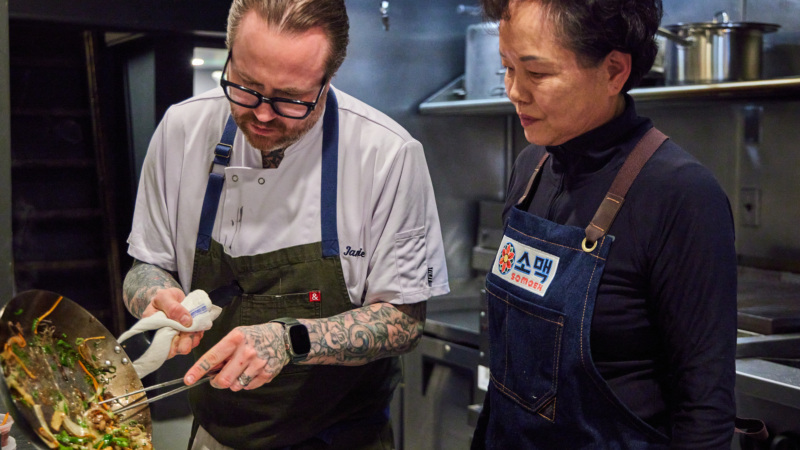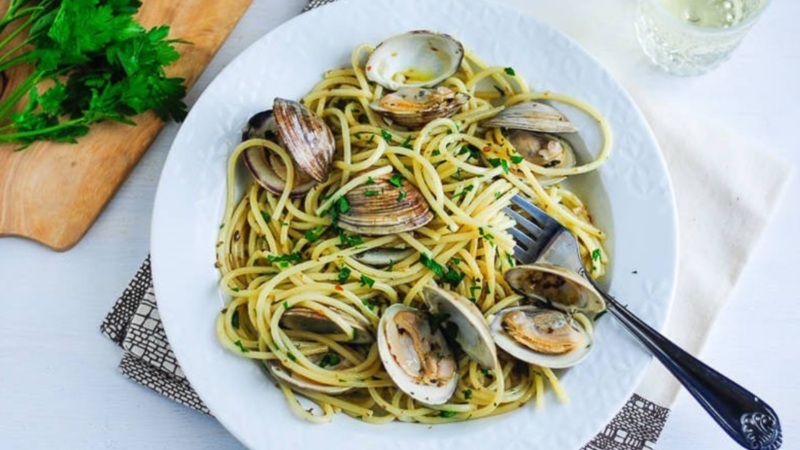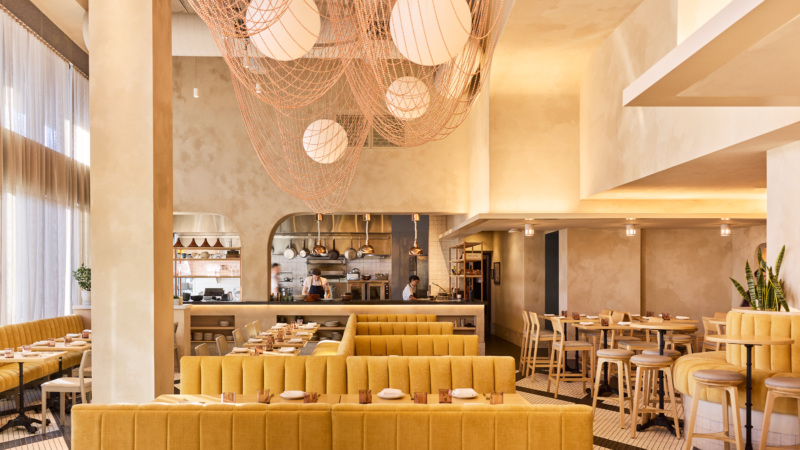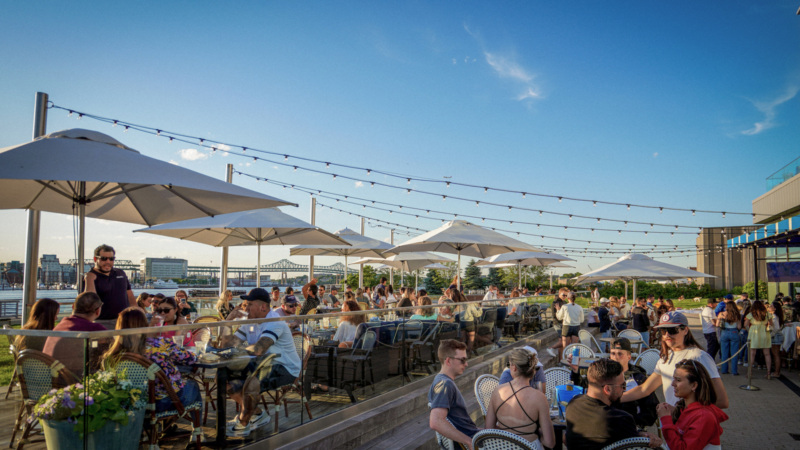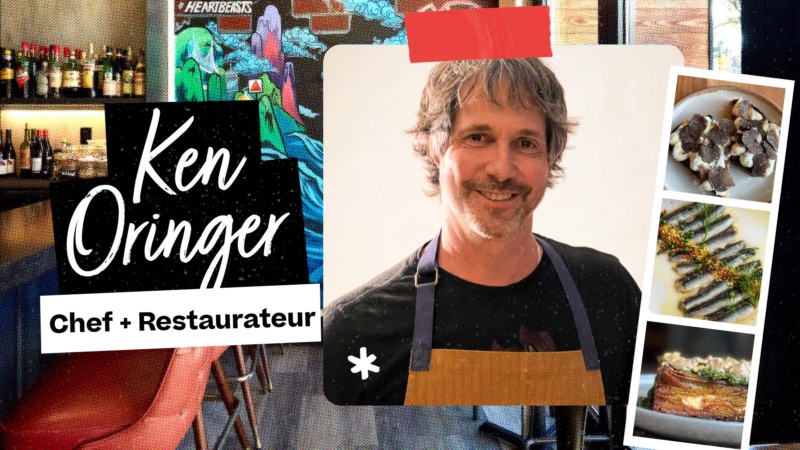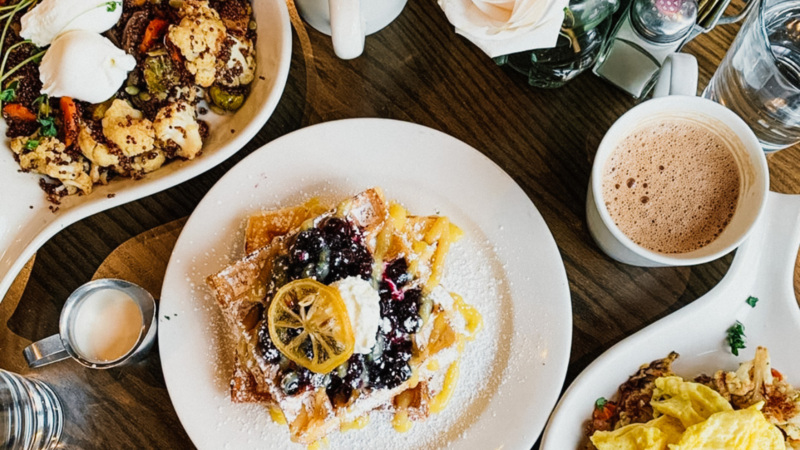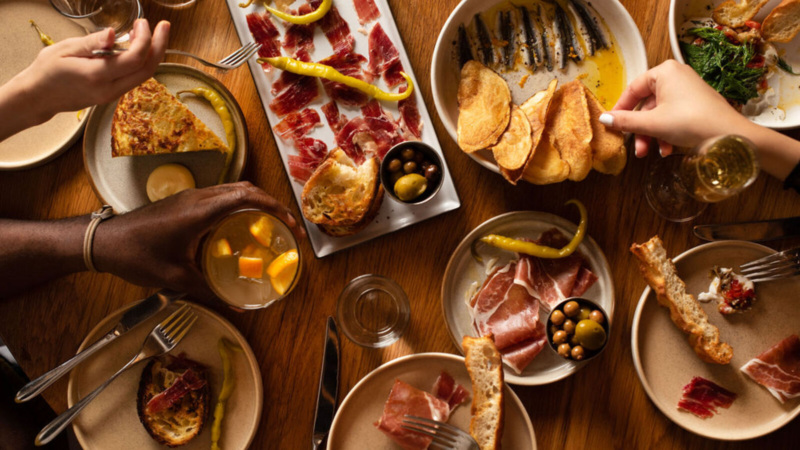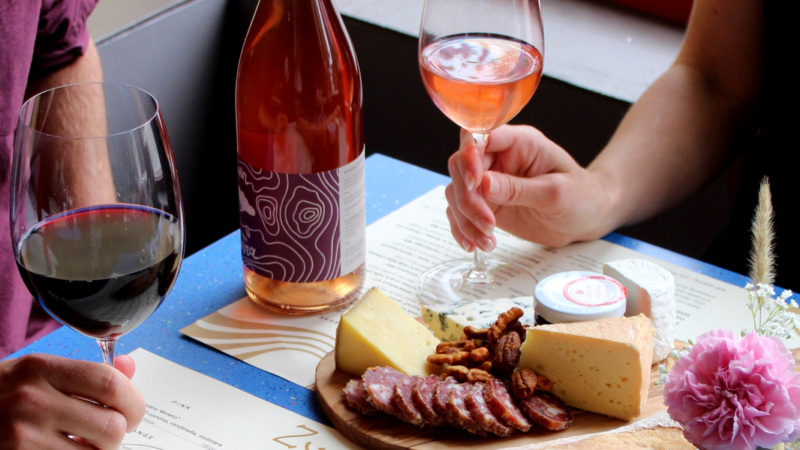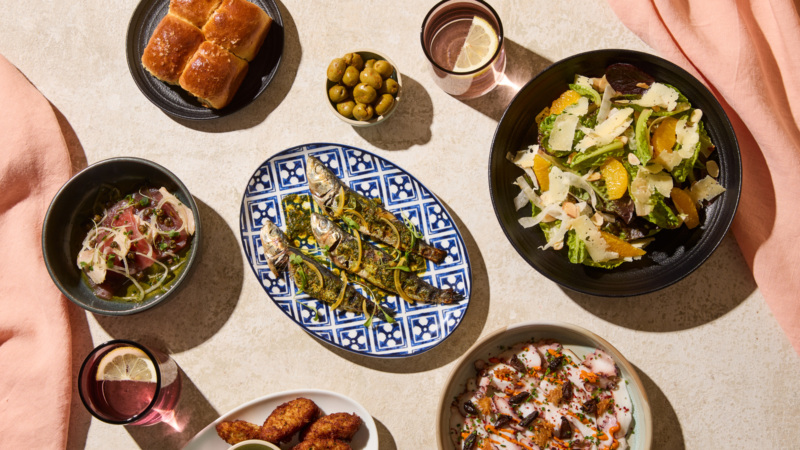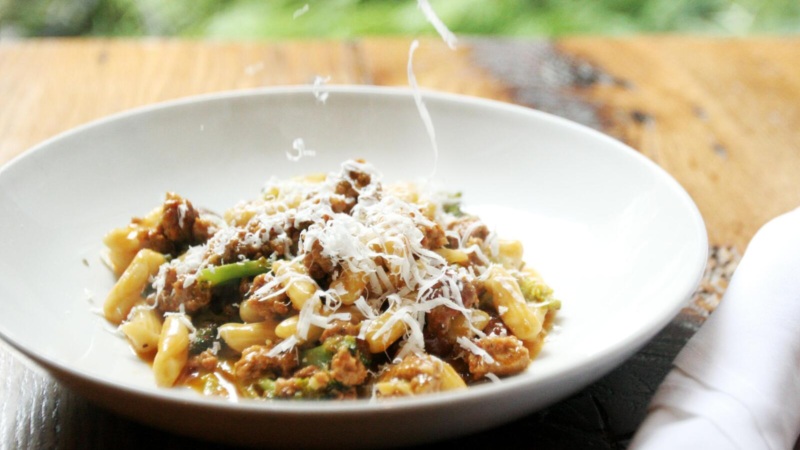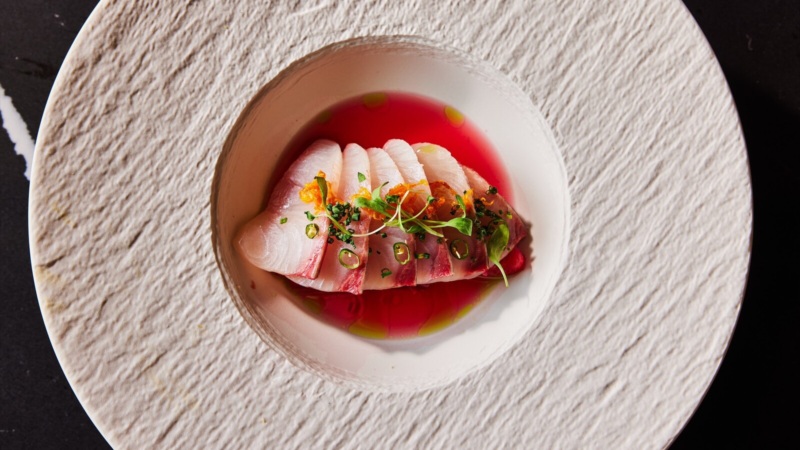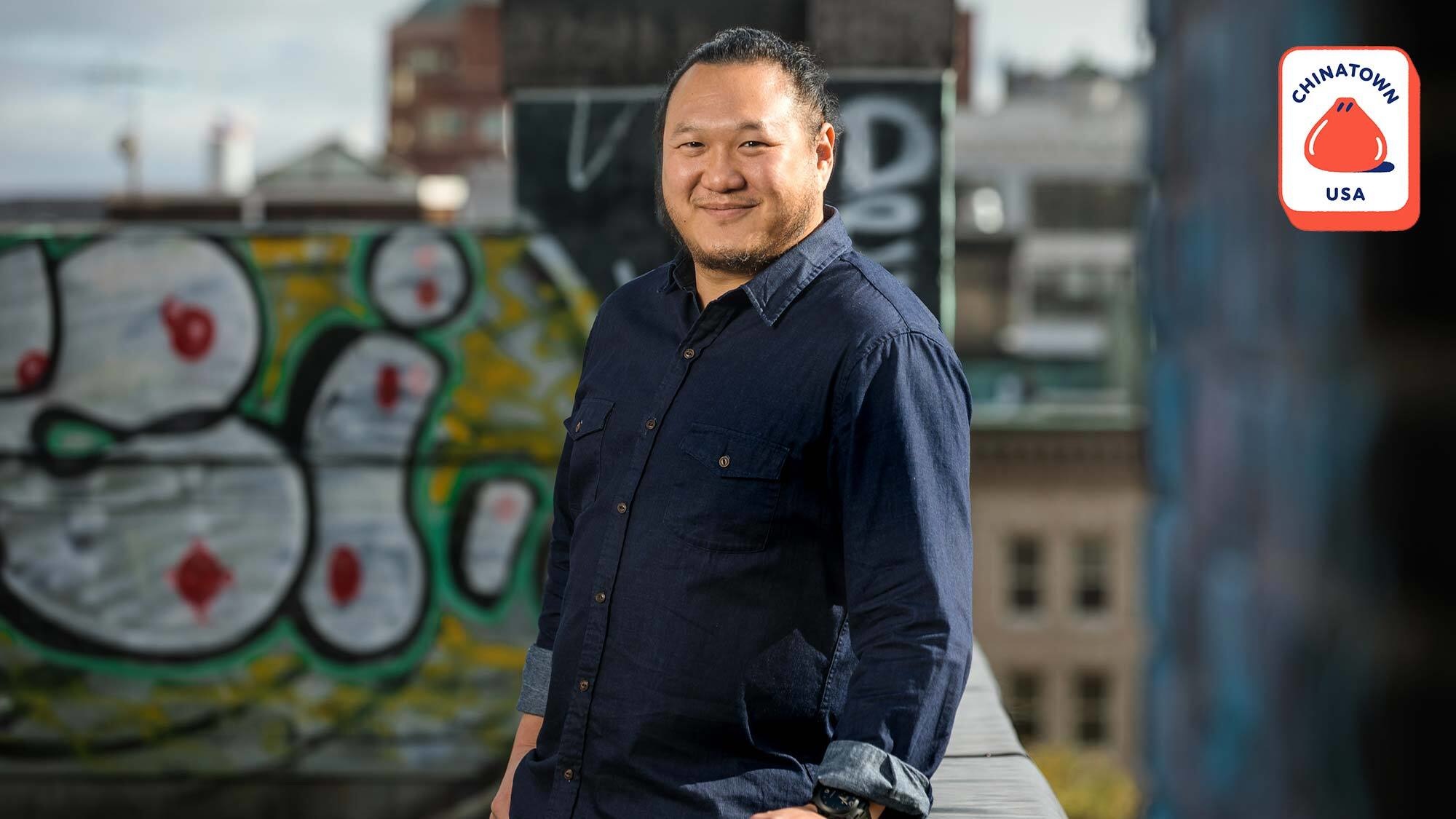
In Boston’s Chinatown, Brian Moy Is Building a Future Without Losing the Past
Since age 6, Brian Moy has spent his weekends, holidays, and summers at his family’s restaurants in Boston’s Chinatown. That includes China Pearl, the Moys’ 60-year-old dim sum destination on Tyler Street, which holds the distinction of being the city’s oldest Chinatown restaurant still in operation.
Of course, if you frequented the place prior to 1960, back when the building housed a dance hall serving chop suey and lo mein, you would hardly recognize it today. A pair of Corinthian columns on the second floor are painted gold, set against a fire-engine-red facade. On the ground floor is Shōjō, Moy’s own gastropub and cocktail bar. Giant illustrated chrysanthemums—done in a graffiti style—frame the front windows. Next door is Ruckus, a fast-casual noodle bar inspired by Moy’s love of pasta. In the before times, Moy’s establishments were easily the only venues in Chinatown where Ludacris, Lil Wayne, and Naughty by Nature played in heavy rotation, a soundtrack for patrons tucking into bowls of ramen and bibim guksu.
Moy, 36, will tell you that, like so many other entrepreneurs in this historic downtown neighborhood, his family has weathered tough times. They survived the SARS virus crisis in 2003, dug out from New England blizzards, and adapted as luxury high-rise developments sprang up all around them. Moy himself has worked tirelessly to maintain his family’s legacy while moving forward with Chinatown projects of his own. Still, he will admit that the coronavirus pandemic left him uncharacteristically shaken.
“It’s tough to come back to business even now,” acknowledges the Massachusetts native. “We don’t know what the revenue is going to be, and how many people are going to be able to come. You just don’t know until you open, so that’s the scary part.”
But the faithful have been lining up at China Pearl for shrimp-and-chive dumplings, spareribs in black bean sauce, and beef chow fun since July, when it reopened for takeout. Shōjō started taking online orders a month later, offering items like Wu Tang Ribs and Shōjōnator, a quarter-pound burger tucked into a sesame bao bun with kimchi-cheese sauce and shaved scallions. Moy added some of the greatest hits from Ruckus — like braised short ribs on rice noodles — to the menu. And customers who spent the summer picking up bags of takeout were delighted to see Shōjō reopen for dining in mid-September, with heaters added in October.
Moy’s great-grandfather, Yau Lum Moy, was the first in the family to immigrate to Massachusetts from Guangdong, known at the time to Westerners as Canton. He got his start not in Boston’s Chinatown, but in Worcester, an hour’s drive west in central Massachusetts. In the 1920s, Chinese immigrants were a growing presence all throughout the Bay State. One of the earliest contingents of Chinese laborers, in fact, had arrived 50 years before, recruited to replace striking workers at a shoe manufacturer in the Berkshires. But Yau Lum Moy didn’t come for factory work. A friend of a friend offered him a job working at a Chinese restaurant called Hong Fong, located on Worcester’s Main Street. That job served as the first step toward building a prosperous life in his new home.
One of the packages that Yau Lum Moy mailed back to his village in Guangdong contained a present for his grandson, Ricky Moy, Brian’s father: a lumberjack hat. More specifically a “Leave-it-to-Beaver, Elmer-Fudd-type hat,” Brian describes it, made of red-and-black-checkered corduroy, complete with earflaps and a soft bill. Ricky would later tuck that hat into his luggage when he, his own parents, and his five siblings traveled to America in the late 1960s, sponsored by Yau Lum Moy, who had by then relocated to Boston.
As a new arrival, Ricky Moy worked in Chinatown, including a stint at China Pearl. He also opened a convenience store, a travel agency, and a driving school for his Cantonese-speaking neighbors. While visiting Taiwan at the invitation of a friend who attended Massachusetts Institute of Technology, Ricky met the friend’s sister, Christine Wang, the woman who would become his wife and later join him in Boston.
The 1980s were a decade of growth and expansion. Ricky and his siblings opened their own restaurant in Chinatown, on Hudson Street, called Ho Yuen Ting, named for a famous pagoda in their home village. (Ricky later rebranded it Best Little Restaurant. When Brian took it over years later, he updated its name to BLR by Shōjō. It closed in late 2019, and remains shuttered during the pandemic.)
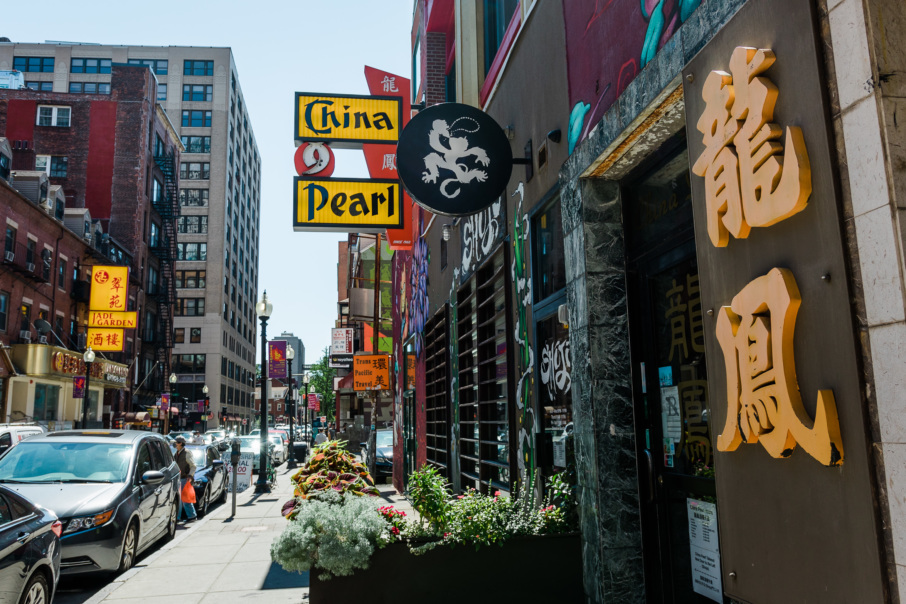
In 1988, the owners of China Pearl asked Ricky if he wanted to purchase the restaurant before it hit the market. Brian remembers his dad getting dressed for a meeting with bank loan officers. “Back then, you didn’t go to banks for loans to start businesses, so it was a big deal,” he recalls. That loan was approved. Shortly after, the family also opened a barbecue-bakery and a restaurant supply store, both within blocks of China Pearl.
“So I used to run between all of the shops,” recounts Moy. “I worked at the barbecue-bakery — my mother was one of the bakers, she operated that — and I helped out on the barbecue side. Then I’d run over to my aunt [at Ho Yuen Ting], and drop off or pick up something, and constantly be back and forth to China Pearl to get inventory.”
There were upsides and downsides to growing up in what Moy acknowledges is essentially a small town dropped into downtown Boston. Some of the old timers gave him a nickname that poked fun at his pudginess. “I’d go down the street and someone would say, ‘Hey, Fat Boy!’” Moy recalls. “And I’d go, ‘Hey, how’s it going?’”
▪️
That older generation was also quick to criticize Moy when he reached a crossroads and wanted to build something new.
“It was a tough time, because I was working six days a week, sometimes seven,” says Moy, referring to his post-college years. He had graduated from Boston University with a business management degree and spent his senior year traveling in Japan and Europe. But he found himself back at China Pearl, still paying his dues to his father and business partners. “If I didn’t open the doors, the business wouldn’t open,” he recalls. “If I didn’t lock the doors, the business wouldn’t close.”
Around that time, his father was in the midst of opening a second location of China Pearl in Quincy. That city, a 10-minute commute down the Red Line, was fast becoming a hub for Chinese American families who were priced out of Boston and looking to put down roots nearby. Looking back, Moy admires his father for having the foresight to see that growth years before it happened. But at the time, Moy was skeptical about the plan. He understood that managing the second location would also be his responsibility.
“I felt really boxed in,” he says. “I wanted to do a place where I can dress the way I want to dress, serve the food exactly how I want to serve it—the drinks, the music, the look, the whole design.”
The restaurant he envisioned would not only be for himself. He wanted to create a place where his non-Asian peers would feel welcome. Moy even came to see that the luxury high-rises nearby would bring in a new demographic of customers.
But the old-timers kept resisting. While they had no say in the project, they acted as if they did. They were convinced he was opening a sushi place, even though he repeatedly told them otherwise. “We almost wanted to call [the restaurant] ‘No Sushi.’”
“A lot of people were nitpicking, saying, ‘Oh, you’re wasting money,’” he continues. “And my dad was not happy about it. He didn’t understand the business. He was worried my first independent venture was going to go sour.”

But Moy could see the place he wanted to build. He felt in his gut the rightness of it — what the space would be like and how he would use his platform. “All the bad stigmas of Chinatown, I wanted to change at Shōjō.” He was determined to show the naysayers that investing in upscale decor, installing a top-tier sound system, and serving a menu of eclectic small plates — not sushi — would draw new customers to the neighborhood.
And flock they did, from all over the city. Soon after Shōjō opened its doors in 2012, it became a destination.
“Ubers would drop off right in front, and there were a lot of first timers to Chinatown,” he recalls. “They ended up becoming regulars with us, and asking us where we like to eat. We would suggest places, and they’d come back and say, ‘Hey, we hate to say we cheated on you tonight. We had dinner at the place you recommended, but we’re having drinks here now. Where can we go next week?’ It was awesome.”
Eight years in, what does his dad say?
“His friends tell me that he’s very proud it’s successful,” Moy says. “He says that I should be working more, and I should be better. I think he is proud of the business I built, but he still thinks it should be better.”
▪️
When you walk down Tyler Street these days, you might do a double take. A row of handsome picnic tables, outfitted with sleek patio umbrellas, form a parklet running the length of the block between Beach Street and Kneeland Street. After months of negotiation, Moy got permission from the city for the transformation. He had the tables custom built to fit snugly between the curb and a line of steel barriers, situated in the bustling, narrow road where cars once parked. Patrons drop by for first-come, first-served seating, looking thrilled that Shōjō — in its new form — has returned. (There are a handful of seats inside, too.) Moy is there, chatting affably with customers from a safe distance.
Inside Shōjō is Patty Moy, manager of China Pearl, which has not yet resumed indoor dining. Instead, Shōjō has been reconfigured as the pick-up point for patrons’ takeout orders. Brian and Patty’s mother, and their youngest aunt, Ann Moy, are on hand to help things run smoothly.
Moy’s plate remains full. He’s still overseeing China Pearl in Quincy, which never ceased takeout operations throughout the pandemic. In addition, he’s poised to reopen Shōjō’s concession at Boston’s Logan Airport. Now a father himself to 4-year-old Jolie and 2-year-old Max, he’s more determined than ever to uphold his family’s legacy while forging his own unique path.
And that lumberjack hat — the one his great-grandfather gave to his own dad so many years ago? Ricky gave it to his son when Brian was in first or second grade. Life, indeed, is coming full-circle — and a family legacy in Chinatown rolls on.
“I was the same age as when he got it,” Moy says. “Yeah, I beat it up, but I still have it. I’m planning on giving it to my son.”
Ellen Bhang is a Boston-based food and wine writer whose work appears regularly in The Boston Globe and The Food Lens. Follow her on Instagram. Follow Resy, too.

